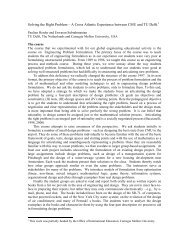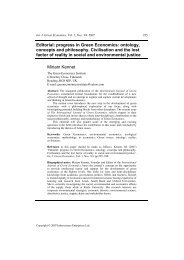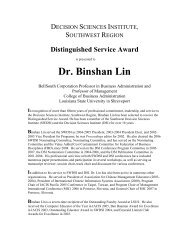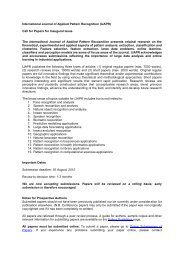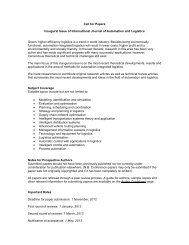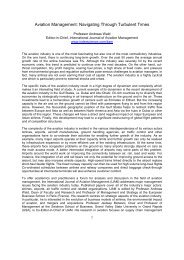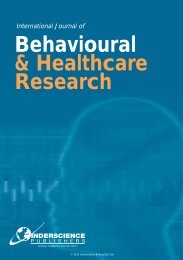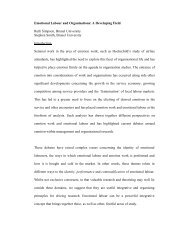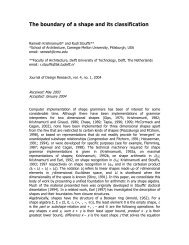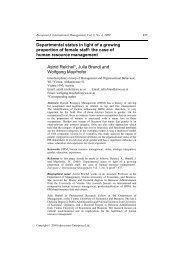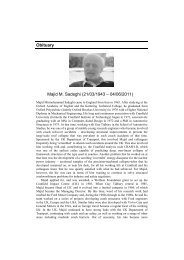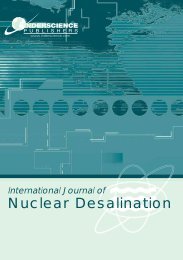A new Zeitgeist for international business activity and ... - InderScience
A new Zeitgeist for international business activity and ... - InderScience
A new Zeitgeist for international business activity and ... - InderScience
You also want an ePaper? Increase the reach of your titles
YUMPU automatically turns print PDFs into web optimized ePapers that Google loves.
296 J.H. Dunning<br />
8 Conclusions<br />
In conclusion we set out some bullet points in Table 9. These we present without<br />
comment. As can be seen there are great opportunities <strong>and</strong> daunting challenges facing<br />
<strong>international</strong> <strong>business</strong> <strong>and</strong> management researchers <strong>for</strong> the <strong>for</strong>eseeable future; <strong>and</strong> we<br />
have probably only identified the tip of the intellectual iceberg. In particular, we have<br />
given only superficial attention to the proposition that the content <strong>and</strong> quality of a firm’s<br />
belief systems, institutions <strong>and</strong> collective learning, <strong>and</strong> how these might adjust to the<br />
external economic <strong>and</strong> social challenges with which they are now being faced, are<br />
key determinants of their per<strong>for</strong>mance. Neither have we examined the likely impact<br />
of future world scenarios on the PE <strong>and</strong> HE (Perlmutter, 2007). 13 Certainly the IB agenda<br />
is running out of steam! On the contrary, its prospects as a highly relevant, integrated<br />
<strong>and</strong> interdisciplinary body of knowledge are as exciting as they have ever been. It is up to<br />
us to ensure that we do not let the <strong>for</strong>efathers of our discipline – such as John<br />
Fayerweather, Richard Robinson <strong>and</strong> Herbert Simon, nor, indeed, future generations of<br />
scholars – down.<br />
Table 9<br />
Conclusions<br />
Contemporary global events are giving rise to a <strong>new</strong> <strong>Zeitgeist</strong> on the extent, pattern <strong>and</strong><br />
ownership of IB <strong>activity</strong>; <strong>and</strong> of our scholarly underst<strong>and</strong>ing <strong>and</strong> explanation of it<br />
Between them, these events <strong>and</strong> their implications are producing a <strong>new</strong> <strong>Zeitgeist</strong> of the human<br />
<strong>and</strong> physical environment, <strong>and</strong> of how each interacts with the other<br />
This is affecting the characteristics, legitimacy <strong>and</strong> governance of IB <strong>activity</strong>, <strong>and</strong> the influence<br />
exerted by the main interest groups in the global economy<br />
The <strong>new</strong> <strong>Zeitgeist</strong> also requires a more institutional based approach to our underst<strong>and</strong>ing the<br />
motivation <strong>and</strong> behaviour of firms <strong>and</strong> governments in creating <strong>and</strong> organising RCMs: <strong>and</strong> to<br />
interpreting <strong>and</strong> evaluating the per<strong>for</strong>mance of firms<br />
The increasing role of institutions <strong>and</strong> the growth of unpredictable events suggests that the<br />
dominant research epistemologies of IB may need to be modified, or at least complemented by,<br />
those most suited to an underst<strong>and</strong>ing of IB <strong>activity</strong><br />
But, we are still at the early stages of underst<strong>and</strong>ing the dramatic changes occurring in the<br />
<strong>international</strong> human environment. In view of this the possible application of chaos or complexity<br />
theory <strong>and</strong>/or less quantifiable non causal/function <strong>and</strong> common sense scholarly approach to<br />
underst<strong>and</strong>ing the phenomena be<strong>for</strong>e trying to rigorously measure its significance is needed<br />
There is also need <strong>for</strong> the IB profession to better appreciate this latter kind of approach in the<br />
scholarly endeavour of its constituents<br />
We are too entering a <strong>new</strong> era which will challenge the upgrading of both the PE <strong>and</strong> HE<br />
environment (e.g., impact of global warming <strong>and</strong> conflicts among belief systems)<br />
International <strong>business</strong> has a unique role to play in underst<strong>and</strong>ing <strong>and</strong> assessing the importance<br />
of the interface between multiple HEs <strong>and</strong> PEs as they affect<br />
(a) globalisation in general<br />
(b) the determinants <strong>and</strong> consequences of MNE <strong>activity</strong><br />
(c) the per<strong>for</strong>mance of MNEs




